Resilient Catchment Communities
UK’s Shared Prosperity Fund
CIoS Good Growth
About the project
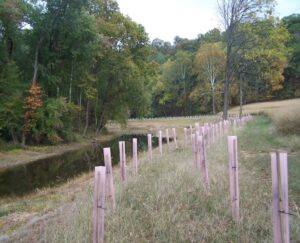
Resilient Catchment Communities (RCC) is a collaborative project and approach in community monitoring of river resilience, and capacity building and capability in the design, implementation and monitoring of community-led Nature-Based Solutions (NBS) to deliver Integrated Catchment Management (ICM).
NBS address societal issues such as climate change to support ecosystems, biodiversity, and human well-being.
ICM is the coordinated delivery of water-based societal needs, such as flood risk, drought management, pollution control
and the protection of aquatic habitats and species,
in one approach.
Our latest news
Cardinham Woods NFM & Habitat Enhancement Works
In September 2024, we worked with Forestry England along the river bank in key locations at Cardinham Woods to improve habitat for fish, invertebrates and riparian species.
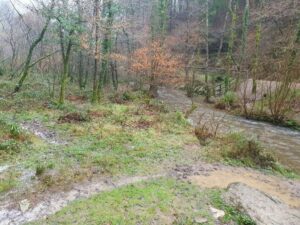
Muddy surface water runs into the river because of bare soils and eroded channels. Habitat works will help to restore the function of the floodplain
This work is also intended to reduce pollution from sediment entering the river and help to improve the function of the floodplain in soaking up water, reducing the severity of flood events.
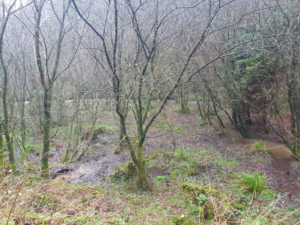
Developing wet woodland with a single age stand of willows that will be coppiced to create more diversity of structure and more light into the ground layer.
We felled, coppiced and pollarded some riverside trees. This allows more light in, encouraging the growth of ground level vegetation which acts as a buffer for pollution running off the land, and provides food and shelter for wildlife. The more varied structure of the woodland managed in this way creates niches for different species. We avoided the felling of large trees and those with potential to host bat roosts.
The cut material has been used on the site to re-direct and slow flows of water, partially block ditches and increase dead wood and woody habitat within the watercourse itself. This helps reconnect the floodplain with the river and supports the development of a special wet woodland habitat, including species such as willow, alder and hazel.
Carrying out these interventions at this tme reduced the risk of disturbing nesting birds, breeding bats, dormouse, and salmon and trout spawning sites. Ecological checks have been carried out prior to and during the works.
Further images of the work in progress:
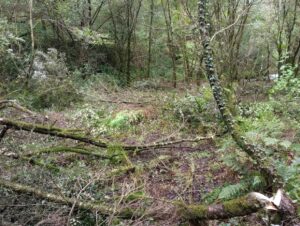
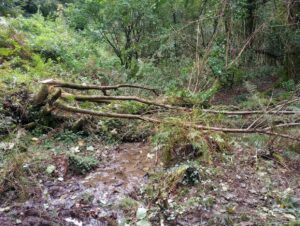
Water Level Sensors & Citizen Science Monitoring
Reseach Fellow Rupert Goddard from the University of Plymouth’s Sustainable Earth Institute shares a film about the water level sensors he has put in place upstream of our Natural Flood Management work at Cardinham Woods.
These will monitor the effectiveness of our interventions at slowing the flow of water.
We are also encouraging volunteer citizen scientists to get involved with the project by taking images from a smartphone cradle opposite the water level monitoring site.
The photos gathered can be sent to the team via [email protected] and will be put into a machine learning algorithm to automate reading the depth of the river. The more we know about our local rivers, the more resilient we can become as communities.
Watch the film at: https://youtu.be/DjUpMTQhvEE?si=cepkBn5KobApsvUN
Nature-Based Solutions (NBS)
After rainfall, water runs off our catchments quick and dirty causing flooding, pollution and at a later point drought, compared to a resilient system where water leaves slow and clean. NBS features are designed to reverse the simplification and speed up drainage patterns.
The project will increase community understanding of river resilience and the creation of six key NBS demonstration sites across Cornwall.
Through these, communities, farmers, environmental NGOs, contractors and funders can see how the density, diversity and interconnectedness of NBS measures can be delivered alongside sustainable food production and the farm
business model.
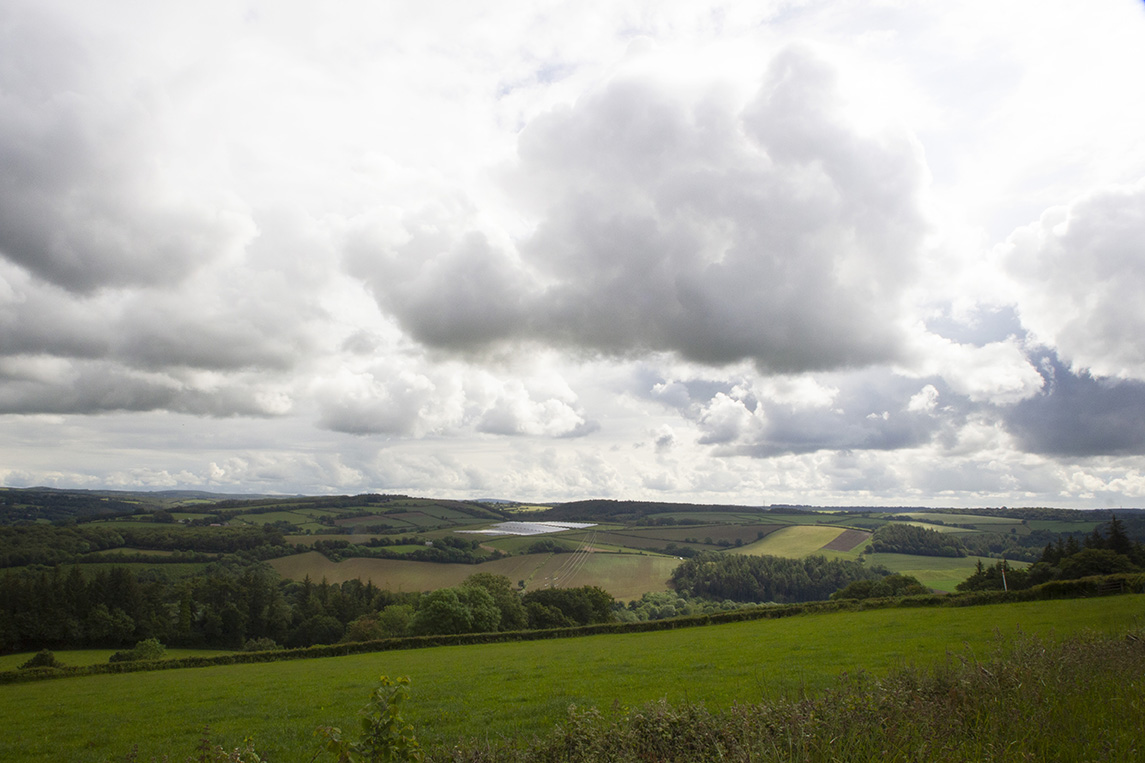
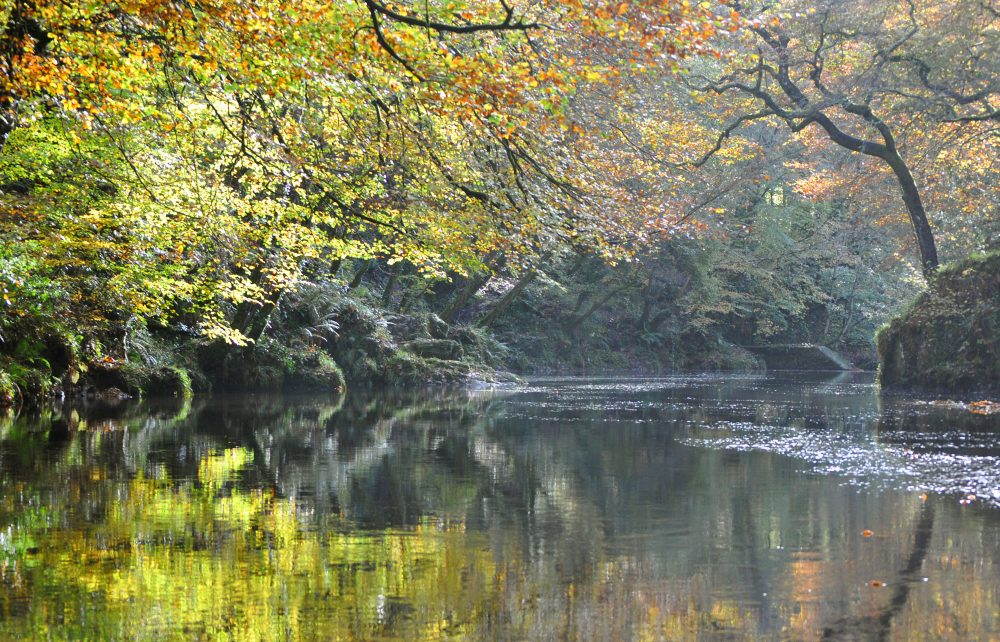
Our Funding & Partners
Although several organisations will help steer the project, such as the Environment Agency and the Cornwall and Tamar Catchment Partnerships, it is delivered through a tri-partite group of Westcountry Rivers Trust, University of Plymouth and Duchy College.
The aim of this grouping is to provide a virtual and physical platform to communicate and train people and communities on how river resilience (both water quantity and quality) is impacted by the built, farmed and natural assets upstream and how NBS can be designed and deployed alongside multiple drivers such as food and energy production.
This project is funded by the UK Government through the UK Shared Prosperity Fund via Good Growth Cornwall & Isles of Scilly.
The UK Shared Prosperity Fund is a central pillar of the UK Government’s Levelling Up agenda and provides £2.6 billion of funding for local investment by March 2025. The Fund aims to improve pride in place and increase life chances across the UK by investing in communities and place, supporting local business, and people and skills.
- Lead Organisation: Westcountry Rivers Trust, University of Plymouth and Duchy College
- Investment Priority: Supporting Local Business
- Fund: Net Zero and Resilience and Green Skills Programme
- SPF awarded: £470,000
- Location: Cornwall wide



